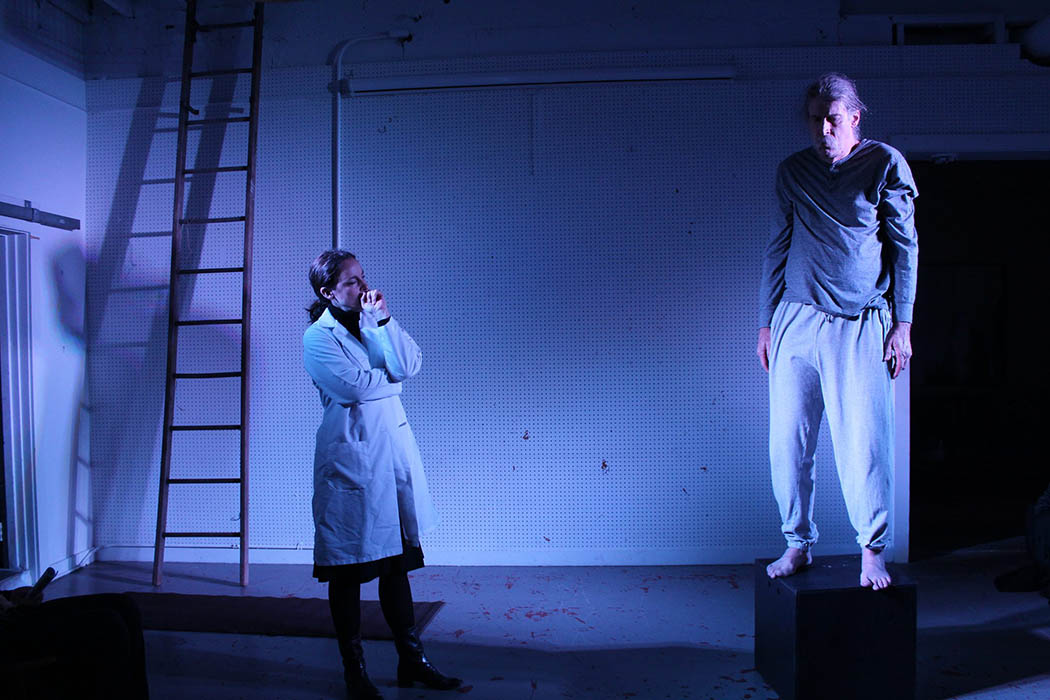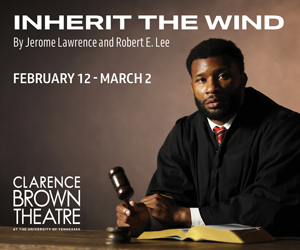As night fell and temperatures dropped, snow had begun to fall. Drifting down slowly at first then faster and thicker, the snow melted on the asphalt warm from the afternoon traffic, but began to stick on windshields and motionless objects. With that background, we found ourselves surrounded by Winter—cold and monochromatic—the perfect time to be drawn into the visually minimal and alternative non-reality world of playwright Samuel Beckett.
The occasion was a production of three of the shorter plays by Samuel Beckett at the Hive on Central, previewed last week on this site. Directed by Dennis E. Perkins, Catastrophe, Come and Go, and Footfalls explored not only the Beckett topics in each, but also the issue of absorbing and interpreting Beckett’s rather precise stage directions. In some way equal to the actors’ participation is that of the audience who find themselves pulled and manipulated by the strangely satisfying theatrical gravity, each individual making, or rejecting, connections and conclusions.
The three plays employed just five actors, all Knoxville-based performers, all finding illustrative keys to communicating with the stylistic requirements of Beckett. In Footfalls, the audience is challenged with the issue of psychological immobility. Caroline King is “May,” a woman of indeterminate age clad only in an old nightgown and slippers. Her appearance is “ghostly,” as Beckett intended. In the first of four parts, May audibly paces slowly, back and forth on floorboards, having a conversation with her unseen Mother, performed off-stage with a calm vocal solidity by Carrie Thompson. The pacing, “footfalls,” and language is rhythmical and measured, making King’s performance quite impressive.
In Come and Go, Beckett has constructed a numerical or geometric puzzle in which three women—Ru, Flo, and Vi—are seated on a bench, their physical arrangement changing in a precise system of positions, the Beckett text suggesting past lives, lost intimacy, and the sharing of secrets. Although Perkins has given each woman a different color of hat, it is obvious that Beckett intended a visual presentation in which the characters evolve toward an homogenous entity. The work requires substantial dramatic discipline, in this case, beautifully realized by Caroline King (Flo), Biz Lyon (Ru), and Carrie Thompson (Vi).
Perkins opened the evening with Catastrophe, a work dedicated to Václav Havel, the Czech activist and playwright, who would later become the first President of the Czech Republic, but who, at the time of the play’s creation, was a political prisoner.
In Catastrophe, the audience finds itself torn between the motives for piece—whether political symbolism or the “struggle of the universal artist.” An impatient “Director” (Tyler Gregory) and his “Assistant” (Biz Lyon) are in the final stages of arranging a stage presentation that consists entirely of an unspeaking man, termed the “Protagonist” (Kevin Collins), standing on a cramped pedestal. The Assistant has pre-arranged certain aspects of the man’s position and attire, and has to justify her decisions to Gregory’s officious “Director,” an individual irritatingly consumed by self-importance. Kudos go to Lyon for a painfully accurate, and amusing, portrayal of the assistant, and to Collins for the ability to communicate stoicism with just physical attitude.
Perkins, and his producing colleagues Zack Allen and Caroline King, deserve applause for bringing lesser-known Samuel Beckett works to Knoxville’s theatre scene by concentrating on intriguing, but overlooked, corners of the genre. Their continued and future efforts should certainly be encouraged. The three Beckett plays at the Hive (854 N. Central) have five more performances: Saturday and Sunday, January 13 and 14, and Thursday, Friday, and Saturday, January 18-20. All begin at 7:00 PM. Tickets are $12.






